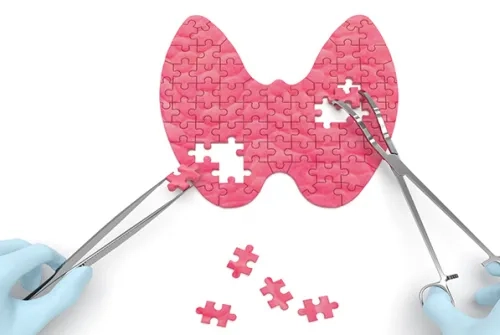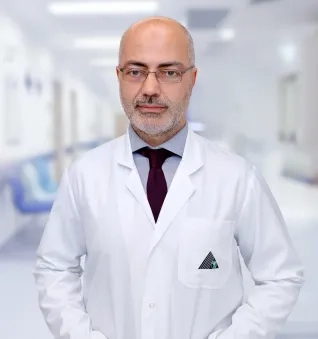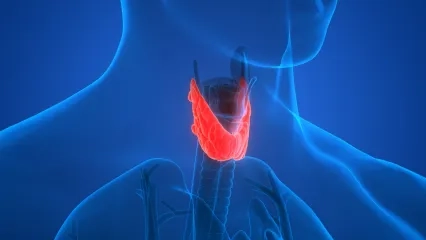Alo Yeditepe
Alo Yeditepe
Thyroid Surgery
How Does Thyroid Surgery Work?
The thyroid surgery starts with a 4 to 5-cm-long incision made to the front of the neck. First, the thyroid gland is reached by opening the thin muscles just below the skin. Since the thyroid gland has two wings like a butterfly, one wing is separated first, then the other wing through the trachea. At the same time, it is necessary not to damage the nerves passing just behind the thyroid gland and leading to the vocal cords and not to dislodge the parathyroid glands, which are the size of brass, located just behind the thyroid gland. The operation takes approximately two hours and is often discharged after the patient has stayed overnight in the hospital.
What Are the Risks of Thyroid Surgery?
As with any surgery, thyroid surgery has some risks. The most important of these are hoarseness and low calcium. Hoarseness is caused by cutting the vocal nerves just behind the thyroid gland during surgery, and low calcium is caused by removing the parathyroid glands without being noticed or disrupting their nutrition by moving them. The most important measure to prevent these complications is the surgery performed by an endocrine surgeon. An experienced endocrine surgeon is the most valuable measure that can be taken at this point.
Is There a Device Showing Voice Nerves in Thyroid Surgery?
Yes, there is. Today, this device is available in many hospitals' operating rooms. They make it easier to find your vocal nerves during surgery. Thus, they have made a great contribution to preventing the cutting of these nerves.
How Many Days Do You Stay in the Hospital After Thyroid Surgery?
They often stay overnight in the hospital. Surgeons visit their patients in bed the morning after surgery. If a drain (a thin hose that will expel the bleeding at the surgical site) is placed in the patient, the amount that comes from this is checked, the patient's pain status, whether there is an unexpected swelling in the neck, and if everything is fine (taking the drains, if any), the discharge procedures are performed. If the patient's entire thyroid gland has been removed (total thyroidectomy), they will be asked to use a thyroid hormone medication.
What to Consider After Thyroid Surgery?
As with any surgery, it is important to keep the wound away from impact and trauma, and the clothes should not touch the wound. Patients most often wonder when to take a bath and if their speech is harmful. You can take a bath a few days after the surgery, and there is no harm in talking, provided that you do not overdo it.
Why Not Just Remove the Nodule?
Simply removing the nodule is easy for the surgeon. It is easy, fast, and low risk of complications to remove the nodule by carving out the inside of the thyroid gland, just like carving out the inside of a pumpkin. However, recurrences after such surgery are inevitable because the risk of subsequent nodule formation in the thyroid gland in which the nodule is removed is quite high and re-operation will be required for this.
Can Thyroid Nodules Not Be Treated Without Surgery?
If the needle biopsy performed on the thyroid nodule came as a suspicion of cancer or cancer, it is wrong to apply non-surgical treatment. These patients must undergo surgery. However, non-surgical treatment options may be considered in patients with benign needle biopsy. These may be radiofrequency treatment, microwave treatment, or atomic treatment (radioactive iodine treatment). Among these, radiofrequency treatment is the most effective and has the lowest potential for side effects.
What is Radiofrequency Treatment?
It is the process of reducing the nodule by burning it by giving local, controlled heat by entering the nodule with a specially made needle without making any incision. The process takes approximately 15-20 minutes. It can be done under local anesthesia or general anesthesia (narcosis). The aim here is not to destroy the great, to destroy it, but to reduce it. After a well-conducted radiofrequency treatment, there is no regrowth in the same nodule, but new nodules may emerge from other parts of the thyroid gland.
How Should Controls Be After Thyroid Surgery?
The first control is performed in the first week after the surgery. The wound site is examined by the physician and the patient's complaints about the first days after the surgery are listened to. Necessary explanations are made. Blood tests are performed one month after the surgery to adjust the dose of the given thyroid drug. Then, a routine follow-up period starts with 6-month periods.
This content was prepared by Yeditepe University Hospitals Medical Editorial Board.
”
See Also
- What is a Parathyroid Adenoma? Symptoms and Treatment
- What is Calcitonin Hormone? Calcitonin Hormone Deficiency
- If the Size of the Thyroid Nodule is Over 4 cm, Be Cautious!
- How Does High Calcium in Blood Cause Complaints?
- A First in the Literature: Parathyroid Cell Obtained from Thyroid Stem Cell
- Diagnosis in Thyroid Diseases
- Assessment of Hyperthyroidism
- Hashimoto's Thyroid Disease
- Thyroid Tumor (Cancer)
- Graves' Disease
- Thyroid Nodules
- Assessment of Hypothyroidism
- What is the Harm of High Calcium in the Blood?
- Frequently Asked Questions in Thyroid Diseases
- Atomic Therapy (Radioactive Iodine Therapy)
- Which Thyroid Nodule Can Be Treated Without Surgery?
- She Was Relieved of Her Pain When the Missing Parathyroid Gland Was Found in The Chest Cavity
- Thyroid Storm Can Turn Life Upside Down
- Recovered From Thyroid Nodule with Needle Melting Method
- Stress Triggers Thyroid Diseases; These Occupations Are At Risk!
- Turkish Physician Developed a Novel Method for Parathyroid Transplant
- What Should Be Considered After Parathyroid Surgery?
- Parathyroid Diseases and Treatment
- They Said It Was Thyroid Cancer, But It Turned Out to Be Parathyroid Adenoma!
- The Frequency of Thyroid Nodules and Thyroid Cancer in Young People is Increasing!
- Thyroid Cancer Treatment Is Possible Without Removing The Entire Thyroid Gland
- Thyroid Storm
- T4 Hormone in 13 Headings
- Questions About Thyroid Diseases
- Thyroid Diseases
- Goiter (Thyroid Gland) Biopsy
- Radiofrequency Therapy in Thyroid Nodules
- What Is Autoimmune Hypoparathyroidism or Hypocalcemia?
- What Is The Loss of Low Calcium Level in Blood?
- What Is The Symptoms of Calcium Level Elevation (Hypercalcemia)?
- How It Is Made The Parathyroid Adenoma Operation?
- What Is Parathyroid Hyperplasia?
- Parathyroid Tumors
- What Are The Parathyroid Glands?
- The Incidence of Thyroid Cancer Has Increased! There is Turkey in the Research!
- Key Surgery Performed In Turkish Hospital For First Time
Alo Yeditepe






